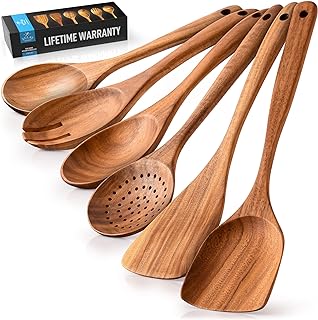Non Toxic Cooking Utensils: A Safe Choice for Healthy Meals

When it comes to cooking, we all want to prepare healthy and delicious meals for our loved ones. But did you know that the cookware you use can have an impact on your health? Many traditional cookware materials like plastic, aluminum, and non-stick coatings contain harmful chemicals that can leach into your food and pose a risk to your health. That’s where non toxic cooking utensils come in! In this blog post, we will explore the importance of using non toxic cooking utensils and the benefits it provides to your health. We will delve into safe materials like stainless steel, silicone, and wooden utensils, as well as unveil the dangers of commonly used materials like plastic and aluminum cookware. Lastly, we will recommend some top non toxic cooking utensils brands that you can trust for a healthier kitchen.
Understanding the Importance of Non Toxic Cooking Utensils
Choosing non toxic cooking utensils is a crucial step in ensuring safe and healthy cooking. By opting for non toxic cooking utensils, you reduce the risk of harmful chemicals leaching into your food during the cooking process. This not only protects your health but also ensures that the flavors of your dishes remain untainted by any chemical reactions. non toxic cooking utensils are designed to be durable and long-lasting, providing you with value for your money. Additionally, using non toxic cooking utensils promotes sustainability and an eco-friendly kitchen, as these utensils are often made from sustainable materials such as bamboo or silicone. By prioritizing the use of non toxic cooking utensils, you can create a safer culinary environment and enjoy cooking meals without worrying about the potential hazards of toxic cooking utensils.
The Health Impacts of Toxic Cookware
Toxic cookware can release harmful fumes when heated, posing serious health risks. Additionally, cooking with these toxic utensils can result in the ingestion of harmful chemicals, which can have long-term health effects. Materials commonly found in toxic cookware, such as Teflon, can release toxins at high temperatures, further increasing the risk to our health. However, by choosing non toxic cooking utensils, we can greatly reduce the risk of toxic chemicals leaching into our food. Non toxic cooking utensils materials like stainless steel, silicone, and wooden utensils are safer alternatives, ensuring that our meals are prepared without the potential health hazards associated with toxic cookware. By prioritizing our health and opting for non toxic kitchen tools, we can create a safer cooking environment for ourselves and our families.
 | Riveira Bamboo Wooden Spoons for Cooking 6-Piece , Apartment Essentials Wood Spatula Spoon Nonstick Kitchen Utensil Set Premium Quality Housewarming Gifts for Everyday Use |
Why Switch to Non Toxic Cooking Utensils
Switching to non toxic cooking utensils is a wise choice for promoting a healthier cooking environment. By using non toxic cookware, you can significantly reduce the risk of health concerns associated with toxic materials. These cookware options are specifically designed to ensure safe cooking, free from harmful chemicals and toxins. Moreover, opting for non toxic cooking utensils aligns perfectly with a conscious and health-conscious lifestyle. It provides peace of mind, knowing that you’re preparing your meals with safe materials that won’t leach harmful substances into your food. So, make the switch to non toxic cooking utensils and enjoy the benefits of cooking in a safer and healthier way.
Exploring Safe Materials for Cooking Utensils
When it comes to choosing safe materials for cooking utensils, there are several options to consider. Stainless steel utensils are a popular choice due to their safety, durability, and versatility. They can withstand high heat without leaching any harmful chemicals into your food. Another safe option is silicone utensils, which offer heat resistance, non-stick properties, and are considered safe for cooking. Wooden utensils, on the other hand, are natural, heat-resistant, and gentle on cookware surfaces, making them a great choice for delicate pans. Non toxic bamboo utensils are also worth considering as they are lightweight, durable, and resistant to stains and odors. By choosing safe materials like stainless steel, silicone, and bamboo, you can ensure that your cooking utensils are free from toxins and contribute to toxic-free cooking.
The Safety of Stainless Steel
Stainless steel utensils, a popular choice for kitchens, offer several safety benefits. These food-safe and durable utensils are resistant to stains, making them suitable for long-term use. One of the key advantages of stainless steel cookware is its non-reactivity, which prevents the leaching of harmful chemicals into food. This eliminates concerns about toxic fumes or chemicals during cooking. Additionally, stainless steel utensils are dishwasher safe, making them easy to clean and maintain. By choosing stainless steel utensils, you can ensure a safe and reliable cooking experience, free from the worries of toxic materials.

Silicone: A Non Toxic Cooking Utensils Alternative
Silicone utensils offer a non-toxic alternative for your cooking needs. These heat-resistant tools are safe for high temperatures and won’t leach toxins into your food. One of the key benefits of silicone utensils is their ability to prevent scratching on cookware, ensuring longevity for your pots and pans. Additionally, these lightweight and durable kitchen tools are dishwasher safe, making clean-up a breeze. The flexibility of non-toxic silicone spatulas and spoons also makes cooking and food preparation much easier. Another advantage of silicone utensils is their compatibility with acidic foods, as they won’t react or cause harmful interactions. When it comes to choosing the best materials for your kitchen, silicone is definitely a safe and practical option.
The Advantage of Wooden Utensils
Wooden utensils offer several advantages when it comes to cooking. Firstly, they are natural and heat-resistant, making them safe for use at high temperatures. This means you can confidently stir, flip, and whisk without worrying about the utensil melting or releasing harmful chemicals. Another benefit of using wooden utensils is that they prevent scratching on cookware, preserving their coating and extending their lifespan. The lightweight nature of wooden utensils also makes them comfortable to handle, reducing strain during cooking. Additionally, they are gentle on cookware surfaces, preventing any damage that could occur with metal utensils. Wooden spoons and spatulas are not only non-toxic but also durable, long-lasting, and eco-friendly. Finally, the rustic charm that wooden utensils bring adds a touch of character to your kitchen, enhancing the overall cooking experience.
Unveiling the Dangers of Commonly Used Materials
Plastic utensils, commonly used in kitchens, have been found to leach harmful chemicals that can pose serious health risks when used for cooking. Similarly, nylon utensils can have their own set of dangers. If exposed to high heat, they can melt, releasing toxic fumes and potentially damaging the surfaces of cookware. Another commonly used material, melamine utensils, contain harmful fillers that can compromise food safety and impact our health.
To avoid these risks, it is important to switch from these toxic materials to safe alternatives. By choosing non toxic cooking utensils made from safer materials such as bamboo or silicone, you can reduce your exposure to toxins and chemicals in the kitchen. Bamboo cooking utensils, for example, are made from a single piece of bamboo and are free from any harmful chemicals. Silicone utensils offer flexibility and are heat-resistant, making them safe for use with high heat.
 | Silicone Cooking Utensil Set,Umite Chef Kitchen Utensils 15pcs Set Non-stick Heat Resistan BPA-Free Stainless Steel Handle Tools Whisk - Grey |
In conclusion, being aware of the dangers associated with commonly used materials like plastic, nylon, and melamine can help you make informed choices for your kitchen. By opting for non-toxic alternatives, you can create a healthier and safer environment for yourself and your loved ones.
The Risks Associated with Plastic Utensils
Plastic utensils pose significant risks when used for cooking. These utensils have the potential to release harmful chemicals, such as BPA, into the food during the cooking process. Additionally, using plastic utensils at high temperatures can result in the production of toxic fumes, which can have serious health implications. Leaching of harmful toxins from plastic utensils can also impact food safety and overall health. To minimize these risks, it is crucial to avoid using plastic cooking tools altogether. Instead, opt for safe and non-toxic materials like stainless steel or silicone. By choosing utensils made from these materials, you can ensure a healthier and safer cooking experience.
Why to Avoid Nylon and Melamine
When it comes to choosing cooking utensils, it is important to avoid nylon and melamine. Nylon utensils can pose health risks as they have the potential to melt, contaminating food and compromising its safety. Similarly, melamine utensils contain toxic fillers that can compromise both food safety and overall health. To ensure safe food preparation, cooking, and storage, it is best to opt for non-toxic materials like silicone or stainless steel. These materials are free from the risks associated with nylon and melamine. By choosing utensils made from safe materials, you can promote a healthier kitchen environment and enjoy peace of mind while preparing your meals.
The Truth Behind “BPA-free” Plastic
BPA-free plastic claims to offer a safe alternative, but is it truly free from harmful chemicals? Research suggests that even BPA substitutes can still leach toxic compounds. When it comes to health-conscious cooking, understanding the risks associated with plastic utensils is crucial. Instead of relying on potentially hazardous materials, opt for safer alternatives such as stainless steel or silicone. These materials are known to be non-toxic and resistant to high heat. Don’t let misleading labels fool you; take the time to do your research before purchasing plastic utensils. Prioritizing food safety and making informed choices about kitchen tools is essential for a healthy cooking experience.
Understanding BPA and Its Possible Dangers
BPA, also known as bisphenol A, is a chemical commonly found in plastic products used for cooking utensils. Extensive studies have linked BPA exposure to various health concerns, including infertility and hormonal issues. The FDA has expressed concerns about the potential risks associated with BPA. To make informed choices when selecting cooking utensils, it’s essential to be aware of the dangers of BPA. Opting for utensils made from materials that are free of harmful chemicals, such as stainless steel or silicone, can help minimize the risk of BPA exposure. By choosing non toxic cooking utensils, you can prioritize the safety and well-being of yourself and your family.

Is BPA-free Plastic Really Safe?
While touted as safe, concerns surround the safety of BPA-free plastic due to potential leaching of harmful chemicals. It’s important to weigh the risks and consider utensils made from non-toxic materials, like stainless steel or silicone, for a healthier cooking experience.
Decoding the Safety of Aluminum Cookware
Aluminum cookware has long been a subject of debate due to concerns regarding the leaching of toxic substances. To ensure safe cooking, it is crucial to understand the potential risks associated with using aluminum utensils. Fortunately, there are alternative options available that offer a safer choice. Materials like stainless steel or cast iron, for instance, provide cookware that is durable, non-toxic, and heat-resistant. By opting for these alternatives, you can mitigate the health risks often associated with aluminum cookware. It’s essential to make an informed decision for your kitchen, taking into account the potential health hazards of aluminum utensils.
The Debate Around Using Aluminum Utensils
Aluminum utensils have generated controversy and concerns regarding the leaching of toxic substances into food. Research shows that cooking acidic foods in aluminum utensils can increase the release of harmful chemicals. To minimize health risks, it is recommended to choose cookware made of safer materials such as stainless steel or cast iron. By educating ourselves about the potential health concerns associated with aluminum utensils, we can make informed decisions about the cookware we use in our kitchens. It is important to opt for cooking utensils that are not only safe but also durable and free of toxic chemicals. By selecting the best materials for our kitchen tools, we can ensure that our meals are prepared in non-toxic and healthy cookware.
Alternatives to Aluminum Cookware
When it comes to choosing cookware that is safe, durable, and free of toxic chemicals, there are several alternatives to aluminum utensils. Stainless steel cookware is a popular choice due to its ability to withstand high heat and its long-lasting durability. Another excellent option is cast iron cookware, known for its exceptional heat retention and non-stick properties. For those looking for a non-toxic alternative, ceramic cookware is gaining popularity in the health-conscious cooking community. By opting for cookware made from materials like stainless steel, cast iron, or ceramic, you can ensure that your kitchen tools are free from toxic substances. Take the time to explore different types of cookware to find the best fit for your cooking needs, as well as your health and safety concerns.
 | Zulay Kitchen 6-Piece Wooden Spoons for Cooking - Smooth Finish Teak Wooden Utensils for Cooking - Soft Comfortable Grip Wood Spoons for Cooking - Non-Stick Wooden Cooking Utensils - Wooden Spoon Sets |
Top Non Toxic Cooking Utensils Brands for a Healthy Kitchen
When it comes to choosing non toxic cooking utensils for a healthy kitchen, opting for reputable brands is crucial. These brands prioritize health, safety, and high-quality materials, ensuring a safe cooking experience. Kitchen utensils made from materials like stainless steel, silicone, bamboo, ceramic, and cast iron are not only safe but also durable. By investing in utensils from trusted brands, you can cook healthily and avoid harmful toxins. It’s important to consider the materials used, safety certifications, and customer reviews of the brand when selecting utensils. So, make a conscious choice and equip your kitchen with utensils from these top non toxic cooking utensils brands for a healthier cooking experience.
Is Non-Stick Cookware a Safe Choice?
When it comes to non-stick cookware, like Teflon, there are concerns about toxic fumes being released when heated. To ensure safety, consider alternatives such as ceramic coating, stainless steel, or cast iron. Make an informed decision for your kitchen by understanding the risks and exploring safe options that align with your needs.
Frequently Asked Questions
What is the safest cooking utensils?
The safest cooking utensils are those made from non-toxic materials like stainless steel, silicone, or natural wood. Avoid plastic utensils as they can release harmful chemicals when heated. Ceramic and cast iron cookware are also good options for safe cooking. Always check the material composition before purchasing any utensil.
Conclusion
In conclusion, non toxic cooking utensils are a safe and healthy choice for your kitchen. Traditional cookware materials like plastic, nylon, and aluminum can leach harmful chemicals into your food, posing health risks over time. Switching to non-toxic materials like stainless steel, silicone, and wooden utensils ensures that you’re cooking with safe and reliable tools. When shopping for non toxic cooking utensils, be cautious of “BPA-free” claims, as some alternatives may still have their own set of risks. It’s important to prioritize your health and make informed choices when it comes to the utensils you use in your kitchen. Invest in top non toxic cooking utensils brands and create a healthy cooking environment for yourself and your loved ones.



